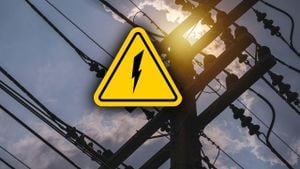Elon Musk, the billionaire founder of SpaceX and Tesla, is once again making headlines, though not all attention is positive. Following his controversial gesture during Donald Trump’s presidential inauguration on January 20, many have interpreted this hand movement as reminiscent of a Nazi salute, leading to significant backlash.
At the inaugural event held at the Capital One Arena, Musk raised his right arm with fingers together and palm facing downwards, thanking attendees and repeating this gesture to those seated behind him. The move, which many critics quickly condemned as politically charged and inappropriate, sparked outrage, especially among those concerned with societal symbols of hate. “The ‘everyone is Hitler’ attack is sooo tired,” Musk remarked on social media platform X, dismissing the accusations as dirty tricks.
Following the uproar, the Deutsches Museum of Science and Technology in Germany took prominent action by removing Musk's portrait from their exhibition dedicated to visionaries. A museum spokesperson commented, “It can always be problematic to honor people who are still alive...a person’s lifetime achievements can often only be correctly assessed in retrospect.” This removal indicates the complex nature of honoring living figures whose actions can lead to public discord.
The public's reaction to Musk's actions has been swift, with scores of Reddit communities banning the posting of links from X as part of their protest against the gesture perceived by some as Nazi symbolism. The movement caught fire after users expressed their disdain for the gesture, with individual subreddits, such as r/NewJersey and r/NBA, implementing bans and encouraging others to do the same over concerns about associational harm.
While many decried Musk, one notable supporter emerged: Argentinian President Javier Milei. He defended Musk’s gesture as “innocent,” attributing the criticism to “wokeism ideology.” Milei characterized Musk as his “dear friend” and suggested the backlash was unwarranted, characterized by ‘unjust vilification’ over what he termed enthusiasm and gratitude.
This dispute raises several questions about the role of public figures like Musk, particularly in today's socially and politically charged climate. Critics from various political angles have pointed out Musk’s previous history of controversial statements as well as his political spending, which reportedly exceeded $277 million during the previous election, backing Trump and other Republican candidates. Supporters, on the other hand, argue for the expressive freedom of individuals, claiming Musk is being unfairly targeted.
Notably, the Anti-Defamation League weighed in on the controversy, describing Musk’s action as “an awkward gesture” made during what was perceived as enthusiasm, indicating it wasn't intended as hate speech. This highlights the complexity of interpretation surrounding gestures and symbols, especially for influential figures who often find themselves at the center of heated public discourse.
Subcommunity moderators across Reddit reflected community sentiments with the content ban, stating, “We do not believe taking a stance against Nazi symbolism is or should be a political issue.” This sentiment suggests broader social responsibility viewed by many users, whether within virtual communities or beyond.
The protests against Musk and the reactions invoke significant cultural conversations about accountability and the interpretation of historical contexts. The chainsaw-wielding cavalry of public opinion, it seems, charges swiftly for those viewed as endorsing or trivializing connection to oppressive symbols.
Despite the controversy, Musk remains one of the world’s wealthiest individuals, boasting a net worth exceeding $430 billion. His influence spans beyond tech, shaping the narratives surrounding political and social issues. Yet, how these narratives develop could have long-standing effects on both public perception and community engagement.
Reflecting on this moment, many are left pondering how influential figures should navigate their expressions within the scope of their visibility and the weight their gestures can carry. Societal expectations increasingly lean toward accountability for historical figures and contemporary influencers alike, especially within the tumultuous political landscapes seen today. This incident involving Musk, regardless of his intentions, has sparked rich discussions about freedom, historical recognition, and the responsibilities individuals hold when partaking in public discourse.



